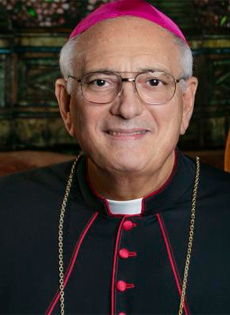
Is immigration history in the United States cyclical?
Monday, June 9, 2025
*Bishop Nicholas DiMarzio
As I am preparing a paper to be given at a university on 100 years of immigration history, I could not help but discover similarities between the situation of our country in 1924 and that of today in 2025. I do not believe that history is cyclical, yet at times, we have returned to making the same mistakes and have not learned the lessons history has taught us.
The major change in 1924 was the Johnson-Reed Act, which changed the immigration policy of the time and placed many restrictions on most immigration to the United States. Unfortunately, the motivation for these restrictions was overt racism, fueled by the strong influence of eugenics, which considered some nationalities inferior to others.
Today, the same racism, which is not as overt as it was in the past, seems to be guiding our current immigration policy. The unfortunate statement by our president that somehow, our blood is being tainted is a clue to understanding this situation.
There are other historical similarities between now and then. At that time, our country had just exited from World War I with a great loss of life and many injured, as well as the decimation caused by the Spanish Flu Epidemic of 1919. Our country has now just exited from the COVID-19 shutdown and two unpopular wars in Iraq and Afghanistan, as well as funding a proxy Third World War being waged in Ukraine and the Gaza Strip.
The 1929 stock market crash and the Great Depression followed the first immigration restriction. It seems today we are on the verge of market correction and perhaps a recession, which will also complete the parallels between 1924 and 2025.
The mood in our nation is not a happy one. The last election left few choices for most people. The initial steps of this new administration seem to raise even more questions and anxiety. And the move for mass deportation of migrants today bears a remarkable similarity to the actions of the past.
In the past, the victims of discrimination were the Southern and Eastern European newcomers, especially the Jewish migrants who wished to come to the United States. The new quota system favored the Northern European countries, including England and Ireland. Although the great migration at the turn of the 20th century was spurred by a need for labor, there were few labor protections for new immigrants.
Today, the victims of discrimination are the Latin American, Asian and African migrants. These new restrictions will make legal immigration very difficult for them. When there are few and lengthy legal paths for migration, people who are forced to migrate find other ways to escape persecution and endemic poverty. This is the root of our undocumented problem.
If new immigration policies are implemented, such as the “gold card” meant for rich investors, and fewer restrictions on high-tech visas, brain drain — a substantial emigration or migration of individuals out of a country — will be felt around the world.
In the past, the restrictive immigration policies lasted more than 30 years. But having much fewer newcomers enter the U.S. also weakened the settled migrants’ economic and political power. The policies put in place after the 1986 immigration reform, which gave legal status to 3 million migrants, have now taken a toll on family unity. The separation of families and the animus against so-called “chain migration,” which allowed families to support other family members, has also deprived settled migrants of family reunification possibilities.
A century ago, certain nationalities were restricted from entering the country, but those already present were not deported en masse. Currently, there are instances of large-scale deportations targeting specific groups, for instance, the Bracero deportations under President Dwight D. Eisenhower in the 1950s.
It is important that we look at history, as it provides many lessons. Understanding these lessons is essential to honor the founding principles of democracy and to avoid repeating past mistakes.

